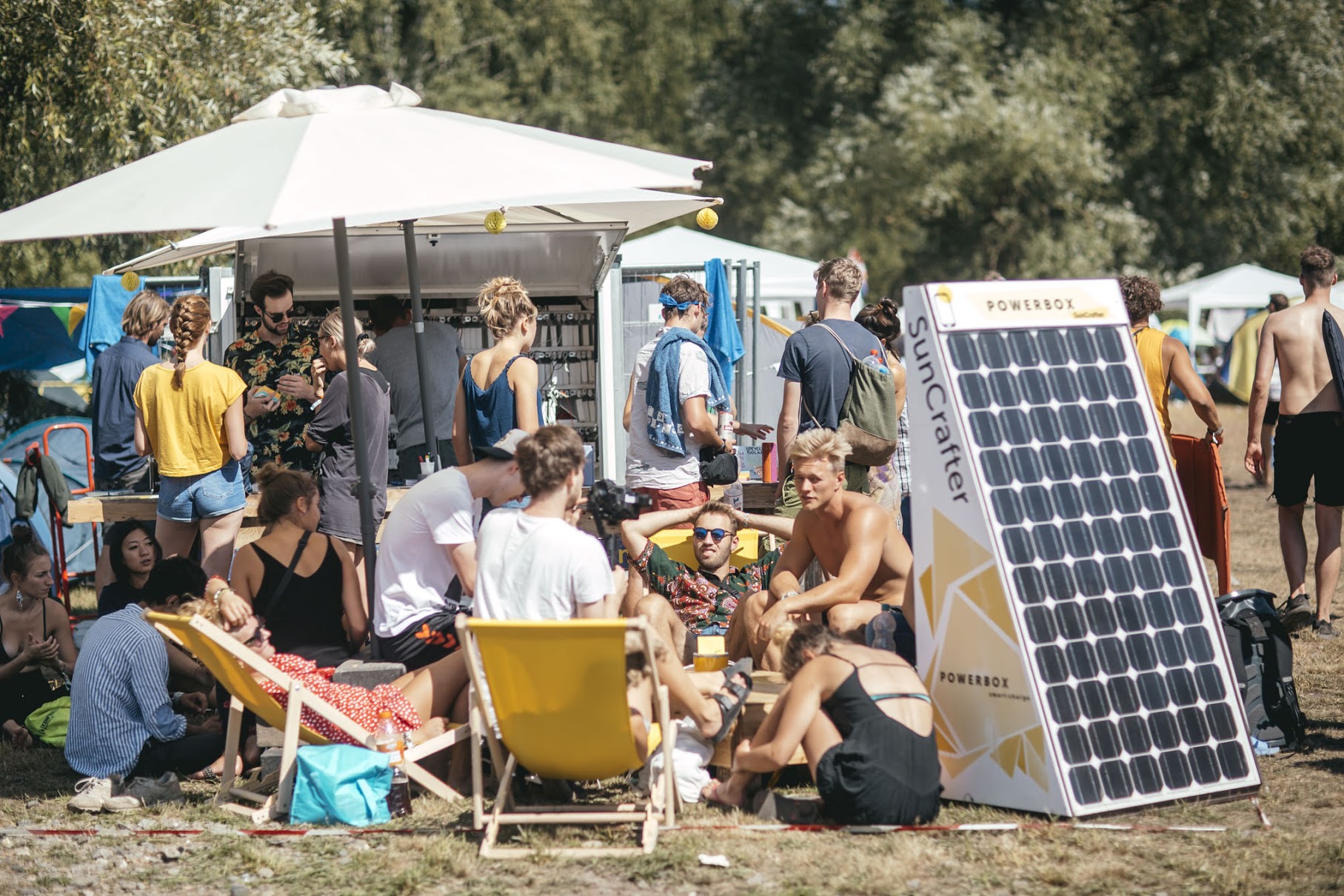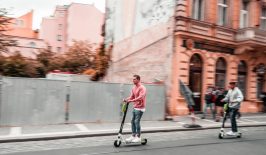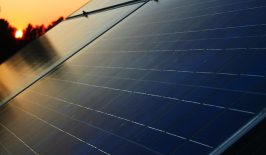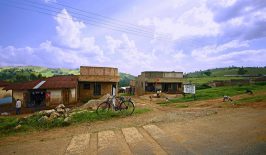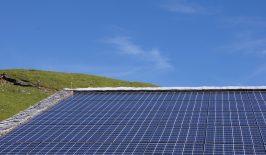Berlin startup SunCrafter uses its own technology to build off-grid charging stations made from using solar panels that they’ve rescued from ending up in landfill. These durable, wood-encased charging stations can be used in urban areas to charge scooters or at festivals and events to charge smartphones and other kinds of mobile devices. And SunCrafter is also developing a solar system for off-grid rural regions in the global South. It’s a project that’s low maintenance and easy to install, and has the potential to help solve numerous power issues in remote regions of the world.
In interview with RESET, co-founder Lisa Wendzich explains how SunCrafter is combining renewable energy and the circular economy and the importance that they see in keeping green innovations as accessible and egalitarian as possible.
Lisa, how did you come up with the idea of creating this off-grid solar system?
As an energy, solar is incredibly simple. And at the same time, it’s also relatively complex. All of the team are into camping and taking road trips and we found it difficult to keep our own basic solar systems running reliably when we were on the road. That’s what made us decide to develop a solar system that had all of the complicated and fragile parts removed – just keeping it really simple. You wouldn’t be able to do anything fancy like power washing machines or air conditioning with that kind of solar system, but all kinds of standard functions would be covered. You could charge your mobile phone, produce light, operate a cool box, a fan. Productive Use applications would also possible. And all kinds of battery-powered smaller devices can be operated with this solar system too, like hair clippers or drills.
Where do you get the solar panels from?
We upcycle industrial panels, which we are currently purchasing through insurance companies. In the past, when panels became defective – after a storm for example – it was worthwhile to send someone to a plant to test the panels individually and remove, repair and then reinstall the defective ones. But now that the price of panels has plummeted, it’s no longer economically viable to do that – it’s just too expensive. So whole groups of panels are replaced at once, meaning that a lot of the ones that end up being scrapped are actually totally OK. And that makes no sense! That was the starting point for us. There are so many people who have no access to electricity and we are here throwing valuable, clean, perfectly functional resources into the trash and then having to carry out energy-intensive recycling of the materials.
Panels need around three or four years of use in order to pay for themselves in terms of the CO2 that they produce. So in other words, if a module is only used for a few years and then ends up being taken apart and recycled, that really makes a big dent in the positive impact that they have.
What will you do with the panels when they reach the end of their life?
Because we run our panels at a very low voltage, they degrade at a much slower rate than they usually would when in use. And there are no delicate parts in the system that could break. So, theoretically the panel will still be usable and able to generate electricity 100 years from now. It wouldn’t be much electricity, of course, but the way we are using the panels is different to conventional commercial power generation in Germany, where the efficiency per panel is incredibly important. We are using the panels to help people become energy self-sufficient or to provide them access to energy at all. We’re expecting them to last for a very long time.
You have also developed a solar energy system that could help support humanitarian relief operations.
That’s right. Our solar hub is the prototype for that future project. In our SunCrafter solar modules, the panel is ideally angled towards the sun, can withstand high winds and is protected inside a wooden cabinet. That makes the whole system very robust.
However, when we first developed the system, the first orders we got were from event organisers. There is a certain crossover between the situtation at a festival and the situation at a refugee camp – in both places, the people involved are in an exceptional situation. Often they are in the middle of a field, but they need electronic devices to find friends, communicate and take pictures. And in both places, charging stations are often handled quite roughly. Our systems have worked well at festivals so far and given us proof that our product works in such environments. We hope that in 2020 or 2021 we’ll be able to provide humanitarian aid. In 2020 we also want to enter the field of rural electrification and are currently in negotiations to start carrying out some pilot projects.
What role does sustainability play for you?
The issue of sustainability is often handled in a very elitist way. In recent years, sustainability has become more of a mainstream issue, but not in every sector of society. But sustainability is a concept that’s very important for us. We certainly don’t see ourselves as elitist, even if we use terms like renewable energy, recycling and global solidarity. We want to be something totally inclusive. After all, it’s all about everyone being on board, everyone understanding what it’s all about and not drawing artificial boundaries.
You’ve also developed a solution for charging e-scooters. Have you already started doing this in cities?
That’s what we’re looking to do for Berlin right now. Those electric scooters that recently got introduced pose a safety risk when they’re parked in the middle of the street or left lying around. Secondly, the people they pay by to collect them up and charge them work under pretty bad conditions. And the way they are collected isn’t sustainable either. They are collected up by conventional combustion vehicles, charged at home using the energy from whatever power supplier that person has and then distributed around the city again – every single evening. That’s why we’ve come up with the idea of placing off-grid charging stations on every street corner. If they’re not in the right place, you can just move them. You don’t need a complex, expensive network connection, you don’t have to calculate and plan anything infrastructural. The off-grid charging stations are upcycled, CO2-neutral and they charge the scooters without causing emissions. Introducing them could genuinely turn electric scooters into a truly sustainable “last mile” solution for urban areas. That’s what we’re now trying to make Berlin politicians understand.
This is a translation of an original article that first appeared on RESET’s German-language site.
